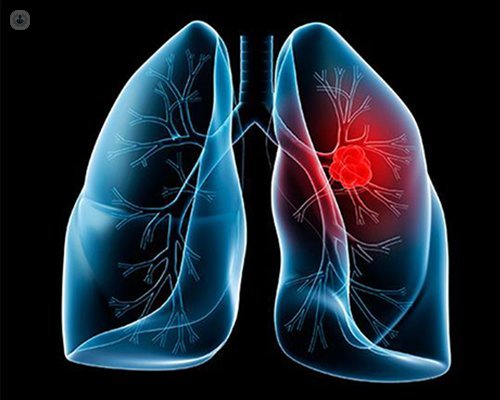How common is lung cancer?
Written by:Lung cancer is the uncontrolled growth of abnormal cells in one or both lungs, which grow into tumours that interfere with the lungs as they provide oxygen to the body via the blood. Lung cancer is one of the most common and most serious types of cancer. It is the leading cause of death from cancer in the UK with around 36,000 deaths each year. Around 44, 500 new cases are diagnosed every year in the UK, where 10-15% are never smokers.

What age range are mostly effected by lung cancer?
It mainly affects the older age range, most commonly diagnosed aged 70-74. It is rare under 40.
What are the symptoms of lung cancer?
There are often no symptoms when the cancer is in the early stage. Most people get any one or more of the following:
- Persistent cough
- Coughing up blood
- Unexplained weight loss
- Breathlessness
- New joint aches and pains
- A change in voice
- Loss of appetite
- Change in the shape of the fingers, known as clubbing difficulty swallowing swelling of the face and neck
- Pain - usually in the chest or shoulder
Many of the above are found in advanced disease.
Treatment of lung cancer
For early stage lung cancer the mainstay of treatment is surgery. Other treatment options are available for those not wishing or unfit for surgery. They include radiofrequency ablation (RFA), cryotherapy (the use of cold temperatures in medical therapy) and various forms of radiotherapy.
The cure rate is highest in the surgical group. For later stages of lung cancer a combination of surgery and chemotherapy may be the best treatment option, still aiming for cure.
A thoracic specialist now offers surgery in cases of lung cancer with limited spread into lymph nodes inside the same side of the chest as the cancer. Advanced cancers rarely require surgery. Usually a radiotherapy or chemotherapy approach is indicated.
What happens during surgery for lung cancer?
The right lung consists of three lobes; upper, middle and lower. The left lung has two lobes; upper and lower. At surgery, the part of the lung containing the cancer is removed along with the rest of that lobe. Sometimes more is removed, depending on the position of the tumour. As much as an entire lung can be removed.
The lymph glands in the chest and in the lung are also removed as part of the routine surgery. There are two approaches to the surgery: thoracotomy (a surgical incision into the chest wall) and Video-Assisted Thoracoscopic Surgery (VATS).
The cuts are smaller with the VATS approach and there is no rib spreading. Early post-operative pain is generally accepted to be less with this approach. All other aspects of VATS, long term survival being the important end-point, are still being investigated. We do not yet know if VATS is equal or superior to open thoracotomy in the long term. Surgical approach remains a joint decision between surgeon and patient.
What is the outlook following surgery?
Lung cancer survival at Miss Beddow's hospital is over 85% at 5 years for stage 1 disease treated with surgery. As the cancer increases in size and spreads the survival diminishes.
Huge advances have already been made looking at the morphology of the cancers and outlook has improved in many cases with targeted therapy.
Some people are now living with lung cancer and not dying of lung cancer.


